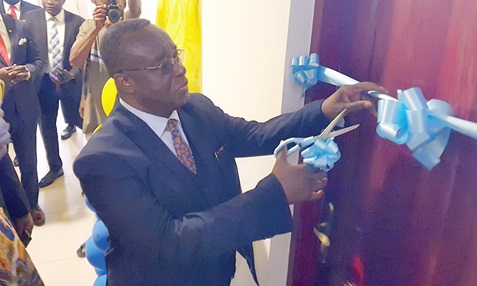The General Legal Council (GLC) will not open the gates of legal education for just anybody to get in, the acting Chief Justice, Justice Paul Baffoe-Bonnie, has said.
He explained that the desire to expand access to legal education had always been tampered by the need to ensure that the country did not destroy the prospects of quality through unregulated open gates, one that would lower standards in the interest of letting everyone in.
To ensure a sustainable path forward on the future of legal education in the country, the acting Chief Justice said the GLC was working with appropriate institutions, including the Office of the Attorney-General, to maintain the highest standards of training for the future good of the profession.
“I want to repeat this. We are not going to open the gates just to let anybody at all to get in.
“You must be proud when you get a chance to enter the Law School. You should be able to tell yourself that I have gotten here through hard work and merit,” Justice Baffoe-Bonnie said when he opened a moot court for the University of Professional Studies, Accra (UPSA) Law School last Monday.
The acting Chief Justice recounted a case at the court in Tema where a lawyer had allegedly stolen his colleague’s phone to sell at a phone repair shop.
He said the lawyer whose phone was missing used a tracking application to locate his phone, which led him to a phone repair shop where he discovered that his friend was negotiating to sell his stolen phone.
He raised concerns about ethical breaches and indiscipline among legal practitioners, and emphasised the importance of integrity and professionalism in the legal field.
Justice Baffoe-Bonnie, therefore, advocated the introduction of legal ethics into law school curricula at the faculty level.
“You will be learning it (ethics) as and when, like English language, because it is important. An indisciplined lawyer is no lawyer at all,” Justice Baffoe-Bonnie stressed.
Step
The acting CJ said the launch of the moot court marked a pivotal moment for the university and its law faculty, emphasising the importance of advocacy training in the legal profession.
He stated that the facility was not merely a physical space but a crucial step towards nurturing the next generation of legal minds.
“This state-of-the-art facility represents a bold step towards fostering justice, equity and the rule of law in our nation," he said.
He further commended the UPSA for its commitment to professional excellence, and highlighted the importance of moot courts in instilling values of fairness, integrity and respect for the rule of law among future lawyers.
"Moot courts are the crucible in which the art of advocacy is forged," he said, underscoring their role in preparing students to uphold justice and protect the rights of the vulnerable.
Tool
The Vice-Chancellor of the UPSA, Prof. John Kwaku Mensah Mawutor, explained that the moot court served as a critical tool for students, allowing them to engage in the practical aspects of law.
“It is where law comes alive,” he said.
He urged the students to embrace their responsibilities and understand that the law was a noble calling requiring integrity and humility.
He further encouraged them to take ownership of the new space, and called on them to prepare not just to argue, but to listen and defend justice.
The Dean of the UPSA Law School, Prof. Ernest Kofi Abotsi, emphasised the importance of the moot court in advancing practical legal education, stating that it reflected UPSA's commitment to training law students not only in theoretical knowledge but also in practical application.
“This is a state-of-the-art moot court facility," he asserted, insisting that it showcased the institution's leadership in legal education.
Moot court
The moot court, a simulated court room, can accommodate about 100 people, with a bench that can accommodate up to five judges during sittings.
The moot court has writings and statements of John Mensah Sarbah, a prominent figure in Gold Coast (now Ghana) history known for his contributions to law, education, and politics, and Justice N.A. Ollennu, a former Supreme Court judge.
The court will serve as a training ground for students to hone their skills in legal reasoning, research, and advocacy, and cultivate the professionalism required to serve as officers of the court through oratory and practical literacy.
Following the opening of the moot court, six students — three from each side — took turns to re-argue the case of Alexander Afenyo-Markin versus the Speaker of Parliament and the Attorney-General with the case title “Romeo Asante versus the Speaker of Parliament and the Attorney-General” during the simulated court sitting.
It was the case in which the Supreme Court ruled in a 5-2 majority decision that a Member of Parliament (MP) does not vacate his seat if he intends to contest in a future election on the ticket of another political party other than the one that brought him to the House.
During the sitting, a Justice of the Supreme Court, Justice Kweku T. Ackaah-Boafo, who led a three-member panel, adjourned the matter after hearing the students argue their points.
Other apex court Justices present at the opening of the moot court were Justices Issifu Omoro Tanko Amadu, Henry A. Kwofi, Richard Adjei-Frimpong and Gbiel Suurbaareh.

